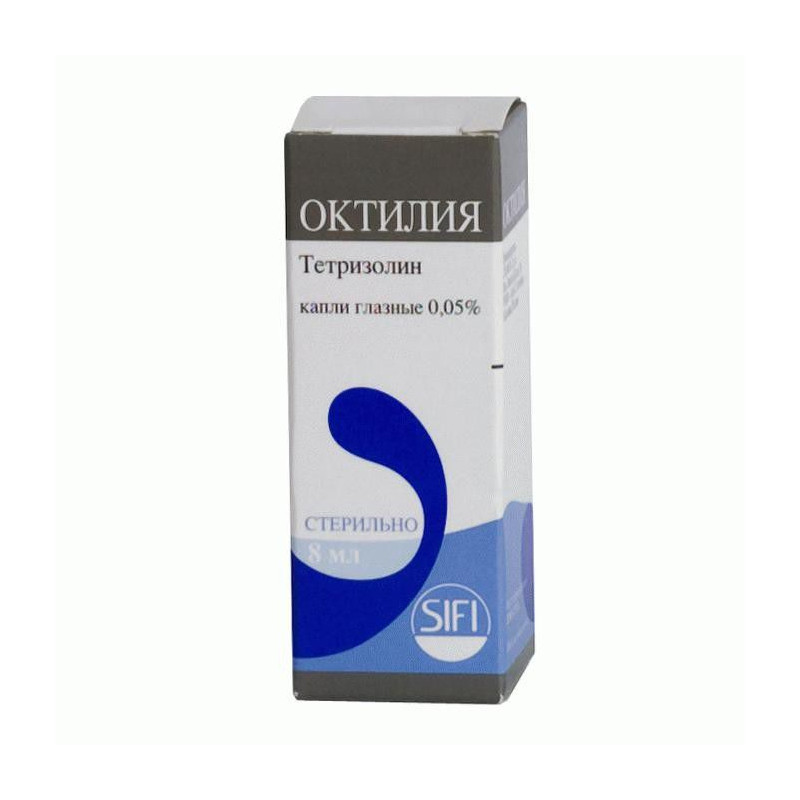



 All payments are encrypted via SSL
All payments are encrypted via SSL
 Full Refund if you haven't received your order
Full Refund if you haven't received your order
drops
1 ml of eye drops contains: tetrizoline hydrochloride 500 mcg
Excipients: Benzalkonium chloride, disodium phosphate decahydrate, potassium dihydrogen phosphate, sodium chloride, sodium edetate, distilled water, distilled chamomile distilled water, lime distilled water, polysorbate 80, purified water
In 1 bottle dropper polyethylene 8 ml drops. In a cardboard bundle one bottle.
Octilia - a drug with a vasoconstrictor action for local use in ophthalmology.
Tetrizoline hydrochloride is an alpha adrenomimetic, an imidazole derivative. It has a pronounced vasoconstrictor effect, reduces swelling and hyperemia of the mucous membranes.
Extracts of chamomile and linden have an anti-inflammatory effect.
As part of complex therapy in the treatment of eye diseases, accompanied by symptoms of irritation caused by allergic, chemical and physical factors (smoke, dust, strong illumination, reflection of light from snow and water surfaces, from radiating screens of monitors).
- Glaucoma.
- Dry eye syndrome.
- Epithelial-endothelial dystrophy of the cornea.
- Children's age up to 3 years.
- Increased individual sensitivity to the components of the drug.
Precautions should be prescribed when:
- Increase blood pressure.
- CHD.
- Arrhythmias.
- Aneurysm.
- Severe organic diseases of the heart and blood vessels.
- Hyperthyroidism.
- Pheochromocytoma.
- Diabetes.
- During treatment with MAO inhibitors and other drugs that increase blood pressure, antidepressants, during pregnancy and lactation (breastfeeding).
Precautions should be prescribed the drug Octyla during pregnancy and lactation (breastfeeding).
The drug is instilled 1-2 drops into the lower conjunctival sac 2-3 times a day.
Local reactions: mydriasis, increased intraocular pressure, burning sensation, reactive conjunctival hyperemia.
Systemic reactions: headache, nausea, drowsiness, weakness, tremor, dizziness, insomnia, palpitations, tachycardia, hyperglycemia, increased blood pressure, impaired heart activity, allergic reactions.
The drug should not be used continuously for more than 4 days without consulting an ophthalmologist.
If within 2 days the symptoms of the disease persist or become more pronounced, consultation with an ophthalmologist is necessary.
The drug should be kept out of the reach of children, becauseIf ingested by chance, the systemic action of the drug may develop.
Patients using contact lenses should use Octilia only with lenses removed. Install lenses can be 15 minutes after instillation of the drug.
The drug should not be used simultaneously with MAO inhibitors and for 10 days after the cessation of their reception.
Symptoms: cyanosis, fever, convulsions, arrhythmias, cardiac arrest, increased blood pressure, pulmonary edema, dyspnea, CNS depression, accompanied by drowsiness, hypothermia, bradycardia, collapse, apnea and coma. It should be borne in mind that the risk of overdose is high in young children, especially if swallowed.
Treatment: antidote unknown. They prescribe Activated carbon, gastric lavage, oxygen inhalation, antipyretic and antiepileptic drugs. To reduce blood pressure, phentolamine is prescribed at a dose of 5 mg slowly in / in or 100 mg orally.
The drug should be stored at a temperature not higher than 25 ° C.
After opening the package, the drug should be stored no more than 28 days.
